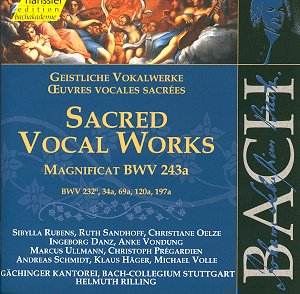BACH
Magnificat/Sacred vocal works
 Sibylla Rubens, Ruth
Sandhoff, Christiane Oelze (sopranos)
Sibylla Rubens, Ruth
Sandhoff, Christiane Oelze (sopranos)
Ingeborg Danz, Anke Vondung (altos)
Marcus Ullmann, Christoph Pregarden
(tenors)
Andreas Schmidt, Klaus Häger, Michael Volle (basses)
Gächinger Kantorei Bach-Collegium Stuttgart/Helmuth Rilling
Recorded 1999/2000
 HANSSLER EDITION
VOL. 140 CD 92140 2 CDs
[76.19]
HANSSLER EDITION
VOL. 140 CD 92140 2 CDs
[76.19]
Crotchet
£17

The Magnificat is a pretty familiar choral work to both audiences and choral
societies alike, though its performing problems are often underestimated
by many of the latter. Above all it is a complex work and lies high for both
choral sopranos and tenors alike, particularly when, as on this recording,
the first version of the work is used. In it Bach uses the higher key of
E flat major rather than in the revised and abridged version a semitone lower
in D major, which is generally the case nowadays. By using the first version
we also get to hear four so-called insertion movements which come as an addendum
to the score with indications as to where they should be sung. The first
is a chorale motet, the second a joyous air also for chorus (both these inserts
are in German), the third a choral Gloria, the fourth a duet for soprano
and bass (these latter two revert to Latin to conform with the rest of the
work). This last duet did not survive intact but Rilling reconstructs it
from its setting in a later cantata (BVW 110). Packed into half an hour of
music is a whole range of emotional, rhetorical and pictorial interpretation,
and at many points one could strip the notes of text and still understand
what Bach is setting (such as 'He hath put down the mighty from their seat'
to a descending stream of choral canonic phrases). Though occasionally slightly
mannered in phrasing, the performance is full of energy, beautifully balanced,
contrapuntally detailed and delightfully sung by an excellent team of soloists.
The second disc is enigmatically entitled 'Early forms and Fragments', a
sort of bits-and-pieces clear up operation to complete the edition. It begins
with two numbers ('Credo in unum Deum' for chorus and 'Et in unum Dominum'
for soprano and alto duet) both of which are slightly different from their
eventual setting in the composer's B minor Mass. The rest of the disc is
taken up with alternative inserts or fragments from four cantatas, the first
of them being three movements from a wedding cantata for Pentecost Sunday
(hence the reference to everlasting fire in the title 'O ewiges Feuer') -
a mixture of recitatives and arias stylishly sung by its four soloists, and
with felicitous harpsichord realisations of the figured bass beneath. A joyously
sung (by Marcus Ullmann) tenor aria framed by two recitatives from 'Lobe
den Herrn' ('Praise to the Lord'), is a revelation in its scoring for treble
recorder, oboe da caccia (akin to a cor anglais), bassoon and organ, an
ear-catching and rare combination of instruments.
It is surprising how often Bach wrote not only for church services as part
of his duties at St Thomas' Church in Leipzig, but also for the Town Council,
hard to imagine the composer of the St Matthew Passion or the B minor Mass
as a bureaucrat. Movements from another cantata - 'Lord God, ruler of all
things' - were probably performed at the council's inauguration and then
again at a wedding later in the same year of 1729. This was typical of Bach
to use and re-work his own music. The highlight here is a duet for alto and
tenor accompanied by a couple of oboes d'amore, strings and organ, and the
concluding familiar hymn tune 'Praise to the Lord' although in a slightly
unfamiliar rhythmic and harmonic setting from what we are currently used
to, and with fearless trumpets scaling the heights in a glorious descant
above the strong-toned choir. The final fragment ('Praise God in the highest')
features a strongly sung aria for bass (Michael Volle) with sprightly played
oboe d'amore accompaniment, and a conventional chorale to conclude.
For Bach collectors these may be curios, but they are finely played and sung
ones in bright, resonant acoustics (town halls so Bach would have approved
no doubt) and are as good as the best of the Hänssler celebrations of
the great man's 250th anniversary of his death.
Performance

Recording

Christopher Fifield
